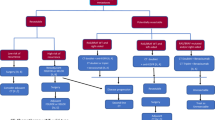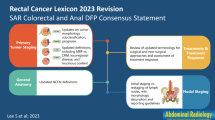Abstract
Purpose of Review
Rectal cancers are treated with chemotherapy, radiotherapy, and surgery. While trials have illustrated the benefits of radiotherapy for locoregional control, recent investigations have questioned the need in select cases. This review seeks to understand why, how, and when radiation can be omitted from rectal cancer management.
Recent Findings
Absolute contraindications of radiation include pregnancy, and relative contraindications include fertility concerns, sexual outcomes, autoimmune conditions, and prior radiation. Low-risk features of rectal cancer might warrant the omission of neoadjuvant radiation. MRI-directed therapy, chemotherapy alone, and immunotherapy may offer future ways to omit radiation.
Summary
While radiation continues to be an essential component for rectal cancer treatment, there may be circumstances that it can be omitted. It is important to educate patients that not receiving radiation is a deviation from standard of care. In the future, we may see developments and changes in the treatment paradigm for rectal cancer.
Similar content being viewed by others
Data Availability
All data generated or analysed during this study are included in this published article.
References
Papers of particular interest, published recently, have been highlighted as: • Of importance •• Of major importance
Νikolouzakis Τ, Mariolis-Sapsakos T, Triantopoulou C, De Bree E, Xynos E, Chrysos E, et al. Detailed and applied anatomy for improved rectal cancer treatment. Ann Gastroenterol. 2019;32(5):431–40. https://doi.org/10.20524/aog.2019.0407.
Stewart CJ, Hillery S, Platell C, Puppa G. Assessment of serosal invasion and criteria for the classification of pathological (p) t4 staging in colorectal carcinoma: confusions, controversies and criticisms. Cancers (Basel). 2011;3(1):164–81. https://doi.org/10.3390/cancers3010164.
Li Y, Wang J, Ma X, Tan L, Yan Y, Xue C, et al. A review of neoadjuvant chemoradiotherapy for locally advanced rectal cancer. Int J Biol Sci. 2016;12(8):1022–31. https://doi.org/10.7150/ijbs.15438.
Thomas PR, Lindblad AS. Adjuvant postoperative radiotherapy and chemotherapy in rectal carcinoma: a review of the Gastrointestinal Tumor Study Group experience. Radiother Oncol. 1988;13(4):245–52. https://doi.org/10.1016/0167-8140(88)90219-8.
Sauer R, Becker H, Hohenberger W, Rödel C, Wittekind C, Fietkau R, et al. Preoperative versus postoperative chemoradiotherapy for rectal cancer. N Engl J Med. 2004;351(17):1731–40. https://doi.org/10.1056/NEJMoa040694.
Harris DA, Thorne K, Hutchings H, Islam S, Holland G, Hatcher O, et al. Protocol for a multicentre randomised feasibility trial evaluating early surgery alone in low rectal cancer (SAILOR). BMJ Open. 2016;6(11):e012496. https://doi.org/10.1136/bmjopen-2016-012496.
Guillem JG, Díaz-González JA, Minsky BD, Valentini V, Jeong SY, Rodriguez-Bigas MA, et al. cT3N0 rectal cancer: potential overtreatment with preoperative chemoradiotherapy is warranted. J Clin Oncol. 2008;26(3):368–73. https://doi.org/10.1200/jco.2007.13.5434.
Hepner A, Negrini D, Hase EA, Exman P, Testa L, Trinconi AF, et al. Cancer during pregnancy the oncologist overview. World J Oncol. 2019;10(1):28–34. https://doi.org/10.14740/wjon1177.
Donegan WL. Cancer and pregnancy. CA Cancer J Clin. 1983;33(4):194–214. https://doi.org/10.3322/canjclin.33.4.194.
Woods JB, Martin JN Jr, Ingram FH, Odom CD, Scott-Conner CE, Rhodes RS. Pregnancy complicated by carcinoma of the colon above the rectum. Am J Perinatol. 1992;9(2):102–10. https://doi.org/10.1055/s-2007-994680.
Siegel RL, Miller KD, Goding Sauer A, Fedewa SA, Butterly LF, Anderson JC, et al. Colorectal cancer statistics, 2020. CA a Cancer J Clin. 2020;70(3):145–64.
Yoon I, Slesinger TL. Radiation exposure in pregnancy. StatPearls. Treasure Island, FL: StatPearls Publishing; 2022.
Ogilvy-Stuart AL, Shalet SM. Effect of radiation on the human reproductive system. Environ Health Perspect. 1993;101(Suppl 2):109–16. https://doi.org/10.1289/ehp.93101s2109.
National Cancer Institue, Bethesda, MD. 2019. https://seer.cancer.gov/csr/1975_2016/. Accessed August 2019.
Teh WT, Stern C, Chander S, Hickey M. The impact of uterine radiation on subsequent fertility and pregnancy outcomes. Biomed Res Int. 2014;2014:482968. https://doi.org/10.1155/2014/482968.
Garcia M, Jemal A, Ward E, Center M, Hao Y, Siegel R, et al. Global cancer facts & figures 2007. Atlanta, GA: Ame Cancer Soc. 2007;1(3):52.
Loren AW, Mangu PB, Beck LN, Brennan L, Magdalinski AJ, Partridge AH, et al. Fertility preservation for patients with cancer: American Society of Clinical Oncology clinical practice guideline update. J Clin Oncol. 2013;31(19):2500–10. https://doi.org/10.1200/jco.2013.49.2678.
Lange MM, Marijnen CA, Maas CP, Putter H, Rutten HJ, Stiggelbout AM, et al. Risk factors for sexual dysfunction after rectal cancer treatment. Eur J Cancer. 2009;45(9):1578–88. https://doi.org/10.1016/j.ejca.2008.12.014.
Wiltink LM, Chen TYT, Nout RA, Kranenbarg EM-K, Fiocco M, Laurberg S, et al. Health-related quality of life 14 years after preoperative short-term radiotherapy and total mesorectal excision for rectal cancer: report of a multicenter randomised trial. Eur J Cancer. 2014;50(14):2390–8. https://doi.org/10.1016/j.ejca.2014.06.020.
Bruheim K, Guren MG, Dahl AA, Skovlund E, Balteskard L, Carlsen E, et al. Sexual function in males after radiotherapy for rectal cancer. Int J Radiation Oncol*Biol*Phys. 2010;76(4):1012–7.
Bruheim K, Tveit KM, Skovlund E, Balteskard L, Carlsen E, Fosså SD, et al. Sexual function in females after radiotherapy for rectal cancer. Acta Oncol. 2010;49(6):826–32. https://doi.org/10.3109/0284186x.2010.486411.
Kunneman M, Stiggelbout AM, Marijnen CA, Pieterse AH. Probabilities of benefit and harms of preoperative radiotherapy for rectal cancer: what do radiation oncologists tell and what do patients understand? Patient Educ Couns. 2015;98(9):1092–8. https://doi.org/10.1016/j.pec.2015.05.009.
Pieterse AH, Stiggelbout AM, Baas-Thijssen MC, van de Velde CJ, Marijnen CA. Benefit from preoperative radiotherapy in rectal cancer treatment: disease-free patients’ and oncologists’ preferences. Br J Cancer. 2007;97(6):717–24. https://doi.org/10.1038/sj.bjc.6603954.
Dickstein DR, Marshall DC. Top, bottom or vers? Creating a more equitable health system for sexual and gender minority patients with prostate cancer. Nat Rev Urol. 2022. https://doi.org/10.1038/s41585-022-00600-6.
Boehmer U, Ozonoff A, Miao X. An ecological analysis of colorectal cancer incidence and mortality: differences by sexual orientation. BMC Cancer. 2011;11:400. https://doi.org/10.1186/1471-2407-11-400.
Boehmer U, Ozonoff A, Winter M, Berklein F, Potter J, Hartshorn KL, et al. Health-related quality of life among colorectal cancer survivors of diverse sexual orientations. Cancer. 2021;127(20):3847–55. https://doi.org/10.1002/cncr.33762.
Boehmer U, Potter J, Clark MA, Ozonoff A, Winter M, Berklein F, et al. Assessing the relationship between symptoms and health care utilization in colorectal cancer survivors of different sexual orientations. Support Care Cancer. 2021;29(10):5821–30. https://doi.org/10.1007/s00520-021-06157-1.
Braun H, Nash R, Tangpricha V, Brockman J, Ward K, Goodman M. Cancer in transgender people: evidence and methodological considerations. Epidemiol Rev. 2017;39(1):93–107. https://doi.org/10.1093/epirev/mxw003.
Bertoncelli Tanaka M, Sahota K, Burn J, Falconer A, Winkler M, Ahmed HU, et al. Prostate cancer in transgender women: what does a urologist need to know? BJU Int. 2022;129(1):113–22. https://doi.org/10.1111/bju.15521.
Lin D, Lehrer EJ, Rosenberg J, Trifiletti DM, Zaorsky NG. Toxicity after radiotherapy in patients with historically accepted contraindications to treatment (CONTRAD): an international systematic review and meta-analysis. Radiother Oncol. 2019;135:147–52. https://doi.org/10.1016/j.radonc.2019.03.006.
Ekbom A, Helmick C, Zack M, Adami H-O. Ulcerative colitis and colorectal cancer. N Engl J Med. 1990;323(18):1228–33. https://doi.org/10.1056/nejm199011013231802.
Najafimehr H, Aghdaei HA, Pourhoseingholi MA, Shalmani HM, Vahedian-Azimi A, Kroh M, et al. A systematic review and meta-analysis on the association between inflammatory bowel disease family history and colorectal cancer. Gastroenterol Res Pract. 2021;2021:4874459. https://doi.org/10.1155/2021/4874459.
Lee Y-C, Hsieh C-C, Li C-Y, Chuang J-P, Lee J-C. Secondary cancers after radiation therapy for primary prostate or rectal cancer. World J Surg. 2016;40(4):895–905. https://doi.org/10.1007/s00268-015-3324-x.
Baxter NN, Tepper JE, Durham SB, Rothenberger DA, Virnig BA. Increased risk of rectal cancer after prostate radiation: a population-based study. Gastroenterology. 2005;128(4):819–24. https://doi.org/10.1053/j.gastro.2004.12.038.
Ohno T, Kato S, Sato S, Fukuhisa K, Nakano T, Tsujii H, et al. Long-term survival and risk of second cancers after radiotherapy for cervical cancer. Int J Radiat Oncol Biol Phys. 2007;69(3):740–5. https://doi.org/10.1016/j.ijrobp.2007.04.028.
Valentini V, Morganti AG, Gambacorta MA, Mohiuddin M, Doglietto GB, Coco C, et al. Preoperative hyperfractionated chemoradiation for locally recurrent rectal cancer in patients previously irradiated to the pelvis: a multicentric phase II study. Int J Radiat Oncol Biol Phys. 2006;64(4):1129–39. https://doi.org/10.1016/j.ijrobp.2005.09.017.
Mohiuddin M, Marks G, Marks J. Long-term results of reirradiation for patients with recurrent rectal carcinoma. Cancer. 2002;95(5):1144–50. https://doi.org/10.1002/cncr.10799.
Ng MK, Leong T, Heriot AG, Ngan SY. Once-daily reirradiation for rectal cancer in patients who have received previous pelvic radiotherapy. J Med Imaging Radiat Oncol. 2013;57(4):512–8. https://doi.org/10.1111/1754-9485.12057.
Tepper JE, O’Connell M, Niedzwiecki D, Hollis DR, Benson AB 3rd, Cummings B, et al. Adjuvant therapy in rectal cancer: analysis of stage, sex, and local control–final report of intergroup 0114. J Clin Oncol. 2002;20(7):1744–50. https://doi.org/10.1200/jco.2002.07.132.
•• Wo JY, Anker CJ, Ashman JB, Bhadkamkar NA, Bradfield L, Chang DT, et al. Radiation therapy for rectal cancer: executive summary of an ASTRO clinical practice guideline. Prac Rad Oncol. 2021;11(1):13–25. https://doi.org/10.1016/j.prro.2020.08.004. (These practice guidelines indicate when radiation should be used for the treatment of rectal cancers based on the opinions of an executive committee.••)
Sebag-Montefiore D, Stephens RJ, Steele R, Monson J, Grieve R, Khanna S, et al. Preoperative radiotherapy versus selective postoperative chemoradiotherapy in patients with rectal cancer (MRC CR07 and NCIC-CTG C016): a multicentre, randomised trial. Lancet. 2009;373(9666):811–20. https://doi.org/10.1016/s0140-6736(09)60484-0.
Benson AB, Venook AP, Al-Hawary MM, Cederquist L, Chen YJ, Ciombor KK, et al. Rectal Cancer, Version 2.2018, NCCN Clinical practice guidelines in oncology. J Natl Compr Canc Netw. 2018;16(7):874–901. https://doi.org/10.6004/jnccn.2018.0061.
Glynne-Jones R, Wyrwicz L, Tiret E, Brown G, Rödel C, Cervantes A, et al. Rectal cancer: ESMO clinical practice guidelines for diagnosis, treatment and follow-up†. Annals of Oncology. 2017;28:iv22–40. https://doi.org/10.1093/annonc/mdx224.
Kennedy ED, Simunovic M, Jhaveri K, Kirsch R, Brierley J, Drolet S, et al. Safety and feasibility of using magnetic resonance imaging criteria to identify patients with “good prognosis” rectal cancer eligible for primary surgery: the phase 2 nonrandomized QuickSilver clinical trial. JAMA Oncol. 2019;5(7):961–6. https://doi.org/10.1001/jamaoncol.2019.0186.
• Lord AC, Corr A, Chandramohan A, Hodges N, Pring E, Airo-Farulla C, et al. Assessment of the 2020 NICE criteria for preoperative radiotherapy in patients with rectal cancer treated by surgery alone in comparison with proven MRI prognostic factors: a retrospective cohort study. Lancet Oncol. 2022;23(6):793–801. https://doi.org/10.1016/s1470-2045(22)00214-5. (This study illustrates the importance of MRI as a tool to help identiy patients that might not require neoadjuvant radiation.•)
Ruppert R, Kube R, Strassburg J, Lewin A, Baral J, Maurer CA, et al. Avoidance of overtreatment of rectal cancer by selective chemoradiotherapy: results of the optimized surgery and MRI-based multimodal therapy trial. J Am Coll Surg. 2020;231(4):413-25.e2. https://doi.org/10.1016/j.jamcollsurg.2020.06.023.
Schrag D, Weiser MR, Goodman KA, Gonen M, Hollywood E, Cercek A, et al. Neoadjuvant chemotherapy without routine use of radiation therapy for patients with locally advanced rectal cancer: a pilot trial. J Clin Oncol. 2014;32(6):513–8. https://doi.org/10.1200/jco.2013.51.7904.
Schrag D, Weiser M, Saltz L, Mamon H, Gollub M, Basch E, et al. Challenges and solutions in the design and execution of the PROSPECT Phase II/III neoadjuvant rectal cancer trial (NCCTG N1048/Alliance). Clin Trials. 2019;16(2):165–75. https://doi.org/10.1177/1740774518824539.
• André T, Shiu K-K, Kim TW, Jensen BV, Jensen LH, Punt C, et al. Pembrolizumab in microsatellite-instability–high advanced colorectal cancer. New England Journal of Medicine. 2020;383(23):2207–18. https://doi.org/10.1056/NEJMoa2017699. (This trial showed that colorectal carcinomas with micro-satellite instability respond well to immunotherapy.•)
Bonneville R, Krook MA, Kautto EA, Miya J, Wing MR, Chen H-Z, et al. Landscape of microsatellite instability across 39 cancer types. JCO Precis Oncol. 2017;1:1–15. https://doi.org/10.1200/PO.17.00073.
• Cercek A, Lumish M, Sinopoli J, Weiss J, Shia J, Lamendola-Essel M, et al. PD-1 blockade in mismatch repair–deficient, locally advanced rectal cancer. New Eng J Med. 2022;386(25):2363–76. https://doi.org/10.1056/NEJMoa2201445. (This small prospective trial showed single agent dostarlimab might be able to treat rectal cancers with MSI.•)
Author information
Authors and Affiliations
Corresponding author
Ethics declarations
Conflict of Interest
The authors declare no competing interests.
Human and Animal Rights and Informed Consent
This article does not contain any studies with human or animal subjects performed by any of the authors.
Additional information
Publisher's Note
Springer Nature remains neutral with regard to jurisdictional claims in published maps and institutional affiliations.
This article is part of the Topical Collection on Radiation Therapy and Radiation Therapy Innovations in Colorectal Cancer
Rights and permissions
Springer Nature or its licensor (e.g. a society or other partner) holds exclusive rights to this article under a publishing agreement with the author(s) or other rightsholder(s); author self-archiving of the accepted manuscript version of this article is solely governed by the terms of such publishing agreement and applicable law.
About this article
Cite this article
Dickstein, D.R., Buckstein, M. What Rectal Cancer Patients May Be Able to Safely Avoid Radiation?. Curr Colorectal Cancer Rep 18, 61–67 (2022). https://doi.org/10.1007/s11888-022-00480-3
Accepted:
Published:
Issue Date:
DOI: https://doi.org/10.1007/s11888-022-00480-3




